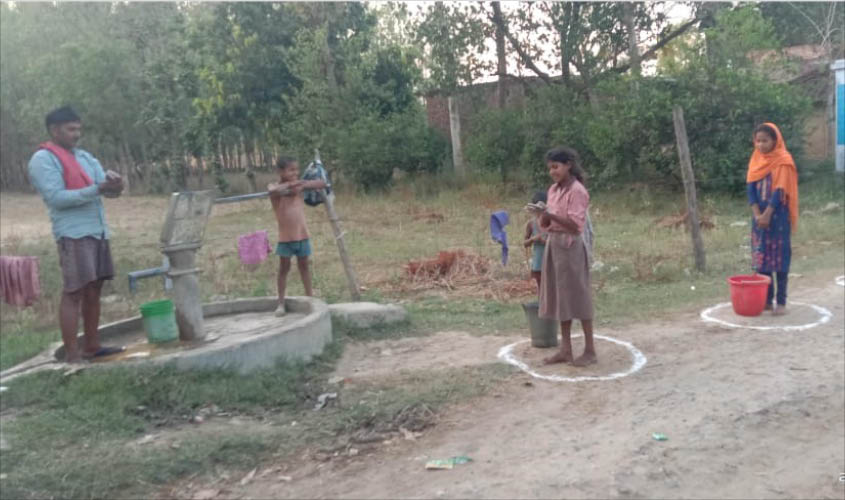Work and livelihood continue to be a challenge and villagers are not eager to get back to the cities when the lockdown is lifted
Even as alarm bells are ringing in migrants’ families in Bahraich, Shravasti and Balrampur in Uttar Pradesh about members who have not returned home, the Aga Khan Foundation, which has been working in these districts for over a decade now is not just hand-holding those in need of support, but also tracking down migrants and giving them helpline numbers in Mumbai, Delhi, Punjab and other places that they are stuck in.
It is facilitating cash withdrawal in Bahraich through business correspondents of Bank of Baroda, stationed at the Apna Seva Kendra at Diha and Charda so that they don’t have to join the queues at banks to get money from Jan Dhan accounts and Kisan Saman Nidhi emergency aid of Rs 2,000 per farmer facilitated by the Central government. Old people are also being helped to withdraw pension money coming into their accounts.
With the support of the Tata Trust, 15 Apna Seva Kendras or Community Service Centres (12 in Bahraich and 3 in Shravasti) were set up by AKF in 2017. Some 20,000 migrants and their families were registered by the Kendras and provided information of their rights and entitlements to various government schemes and even legal counselling so that they were not cheated when hired in bulk by labour contractors. Each Seva Kendra services 8 to 10 gram panchayats. Due to the lockdown, just two of the Kendras are functioning and so far they have helped families to withdraw Rs 150,000 from their bank accounts. The large scale registration of migrants over about three years is now being used to reach out to them and their families with new helpline numbers and information.

Sudhir Chillarega, state project manager of the Foundation for UP, has been able to talk to some 400 migrants, 60% of whom have returned and the rest are still stuck at their places of work outside UP. Many, whose phone numbers have changed or who were unable to charge their phones, could not be contacted. Those who were unable to get back are desperate to return. They have run out of cash and since their ATM cards were with the family they cannot avail of the cash benefits in the big cities. They, however, were happy that their families in the villages have been able to tap into the money that has been transferred into their accounts.
Sunita, a mother of four, said her husband was still in Delhi and was now wary of even attempting to return to Bahraich. He gets his meals from a food distribution centre for migrants, but is fast running out of his savings. Sunita is not going out of her house due to the lockdown, but is getting rations from the government scheme and is particularly happy to have got sufficient wheat to see her family through this period of isolation.
For Jainath, stuck in Mumbai, social distancing is just not possible. After the lockdown, he moved in with a friend and is sharing accommodation with 20 others. Though he has no work, his employer has been good enough to provide food. Anita, a member of a self help group, says her husband is still in Delhi and dependent on government charity. Sometimes he gets a food packet, at other times he sleeps on an empty stomach. He longs for the open spaces of his village home in Bahraich.
Another important measure to put cash in the hands of migrant families and others is the activation of the Farmers Producer Companies to buy wheat directly from the fields of farmers and take them to the mandis for sale. By evening the money is in the hands of the farmers. Acute shortage of cash is a big problem even among migrants who have returned and used up all their money.

Adarsh Anand, a field level worker, says the vocational skill centres and SHGs (self-help groups) in Bahraich have also been activated and 6,000 masks have been stitched and given to farmers and members of the community to use when they step out of their homes for farming. The 13 women selected to make the masks have made Rs 60,000 at Rs 10 a mask.
In addition, to show support to the frontline workers like the 1,500 ASHAs and gram pradhans of Bahraich and Shravasti, additional masks, gloves and sanitizers were handed over to the DMs of the two districts, Shambu Kumar and Yashi Rustagi.
A foot operated hand washing station, fabricated by the NGO and installed at the Bahraich district hospital
Due to its decade long work, the Foundation has a good data base of some 20,000 ASHAs, Anganwadi workers, safai karamcharis and other district and block level officers with whom information is being shared on health, hygiene and the Covid-19 situation in the three districts. Fortunately, there are just a handful of positive cases in the three districts, though recently a 35-year-old exhausted migrant, who walked and hitched a ride on a truck for 14 days collapsed and died within hours of reaching his village and being put in quarantine in Shravasti.
Social distancing is being practised at hand pumps, Apna Seva Kendra and ration shops. People queue up in earmarked circles and wait to collect water, cash and rations. However, there is worry about the migrants who have not yet reached their villages. Work and livelihood continue to be a challenge and villagers are not eager to get back to the cities when the lockdown is lifted. They are looking for work options closer to home.

